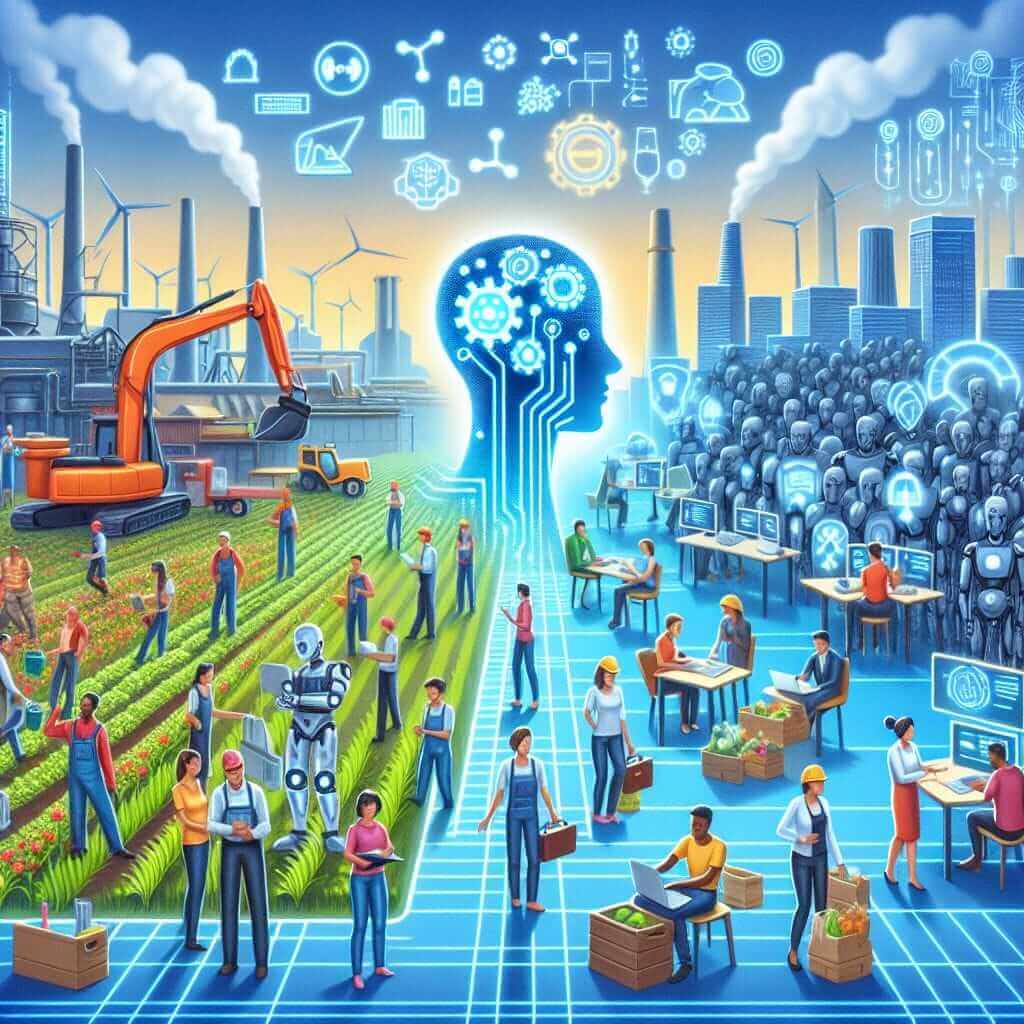The IELTS Reading section can be challenging, but practicing with relevant and timely topics can significantly boost your understanding and performance. One of the trending topics today is the impact of Artificial Intelligence (AI) on global labor markets. This subject has gained popularity in past IELTS exams due to its relevance and broad implications.
Analyzing how AI influences global labor markets is especially pertinent, given the rapid advancements in AI technology. Understanding this topic can prepare you for related questions in the IELTS Reading section. By exploring this topic, you also stay informed about significant economic and technological trends that shape our world.
Main Content
Reading Practice Text
Below is a sample IELTS Reading passage on the topic “What are the impacts of AI on global labor markets?”. This passage follows the IELTS format and falls under the Medium Text category.
The Impacts of AI on Global Labor Markets
Artificial Intelligence (AI) is rapidly transforming industries worldwide, significantly affecting labor markets. The rise of AI has sparked debates on whether it will create new job opportunities or exacerbate unemployment. While some fear massive job displacement, others argue that AI could lead to the creation of new job categories and enhance productivity.
AI’s influence on employment varies across different economic sectors. In manufacturing, AI-powered automation is replacing repetitive and manual tasks, leading to a decline in certain types of jobs. However, this displacement is often offset by an increased demand for AI maintenance and programming roles. Similarly, in agriculture, AI-driven machinery is optimizing crop management, reducing the need for manual labor while increasing efficiency and yield.
The service sector also experiences significant AI-driven changes. In customer service, AI chatbots handle a growing number of inquiries, enabling human employees to focus on more complex tasks. This shift potentially elevates job roles from routine to more intellectually demanding responsibilities. Additionally, AI in healthcare is revolutionizing diagnostics and treatment planning, allowing for more personalized and efficient patient care. Consequently, medical professionals’ roles are evolving, with a greater emphasis on AI technology management.
Despite these advancements, AI’s impact raises several socio-economic challenges. The transition to an AI-driven economy necessitates substantial workforce retraining and upskilling. Regional disparities in AI adoption and integration may exacerbate economic inequalities, with developed countries likely to benefit more than developing ones.
In conclusion, AI’s impact on global labor markets is multifaceted. While it holds the potential to revolutionize productivity and create new job opportunities, it also poses significant challenges that need to be addressed to ensure a balanced and inclusive transition.
 AI Impact on Jobs
AI Impact on Jobs
Questions
Based on the passage, answer the following questions:
Multiple Choice Questions
-
What is a significant argument against AI according to the passage?
a. AI will create more jobs.
b. AI will exacerbate unemployment.
c. AI will not affect job markets.
d. AI will only impact the tech industry. -
Which sector has seen AI-powered automation replace manual tasks?
a. Healthcare
b. Agriculture
c. Manufacturing
d. Customer service
Identifying Information (True/False/Not Given)
- AI is solely reducing job opportunities without creating new roles. (True/False/Not Given)
- Developed countries are likely to benefit more from AI than developing countries. (True/False/Not Given)
Matching Information
-
Match the statements with the correct sector:
a. AI-driven machinery optimizing crop management and efficiency.
b. AI chatbots handling a growing number of customer inquiries.
c. AI revolutionizing diagnostics and treatment planning.i. Healthcare
ii. Agriculture
iii. Customer service
Answers and Explanations
-
b. AI will exacerbate unemployment.
- Explanation: The passage mentions debates around AI exacerbating unemployment, a significant argument against it.
-
c. Manufacturing
- Explanation: The passage states that in manufacturing, AI-powered automation is replacing repetitive and manual tasks.
-
False
- Explanation: The passage describes both job displacement and the creation of new job categories, indicating that AI is not solely reducing job opportunities.
-
True
- Explanation: The passage highlights that developed countries are likely to benefit more from AI than developing ones.
-
Match as follows:
- a. ii. Agriculture
- b. iii. Customer service
- c. i. Healthcare
Common Mistakes and Vocabulary
Common Mistakes
- Overlooking Details: Pay attention to details in the passage to differentiate between similar concepts.
- Misinterpreting Statements: Ensure you understand the context to avoid marking the wrong answer.
Vocabulary
- Exacerbate (/ɪɡˈzæsəbeɪt/): to make a problem or bad situation worse.
- Displacement (/dɪˈspleɪsmənt/): being moved from the usual or proper place.
- Optimization (/ˌɑːptɪmaɪˈzeɪʃən/): making the best or most effective use of a situation or resource.
- Inequalities (/ˌɪneɪˈkwɒlɪtiz/): differences in size, degree, circumstances, etc.; lack of equality.
Grammar Focus
- Conditional Structures: “If AI continues to advance, it may create both challenges and opportunities.”
- Passive Voice: “AI-powered automation is replacing repetitive and manual tasks.”
Advice for High Scores in IELTS Reading
To excel in the IELTS Reading section, practice regularly with various topics, including technology and labor markets. Focus on understanding the passage first before answering the questions. Enhancing your vocabulary and grasping grammar structures will also aid in efficiently tackling the reading passages.


